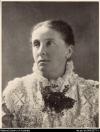Ah, 'twas but now I saw the sun flush pink on yonder placid tide;
The purple hill-tops, one by one, were strangely lit and glorified;
And yet how sweet the night has grown, with palest starlights dimly sown!
Those mountain ranges, far and near, enclasp me,- sharply pencilled there,
Like blackest sea-waves,-outlined here, like phantoms in the luminous air,
Between that cold and quiet sky, and the calm river running by.
The gum-trees whisper overhead, and, delicately dark and fine,
Their lovely shadow-patterns shed across the paths of white moonshine.
The golden wattles glimmer bright, scenting this cool, transparent night.
What spirits wake when earth is still? I hear wild wood-notes softly swell.
There's the strange clamour, hoarse and shrill, that drowns the bull-frogs' hollow bell;
And there's the plaintive rise and fall of the lone mopoke's cuckoo-call.
And nearer, an opossum flits above the firelight, pauses, peers-
I see a round ball where he sits, with pendant tail and pointed ears;
And two are gruffly snarling now in hollows of yon upper bough.
Hark! that's the curlew's thrilling scream. What mountain echoes it has stirred!
The sound goes crying down the stream, the wildest bird-note ever heard.
And there's a crane, with legs updrawn, gone sailing out to meet the dawn.
It croaks its farewell, like a crow, beating the air with soft, wide wings.
On the white water down below its vague grey shadow-shape it flings,
And, dream-like, passes out of sight, a lonely vision of the night.
Ah me! how weird the undertones that thrill my wakeful fancy through!
The river softly creeps and moans; the wind seems faintly crying too.
Such whisperings seem to come and pass across the orchis-flower'd grass.
The darkness gather'd all around is full of rustlings, strange and low,
The dead wood crackles on the ground, and shadowy shapes flit to and fro;
I think they are my own dim dreams, wandering amongst the woods and streams.
The tangled trees seem full of eyes,-still eyes that watch me as I sit;
A flame begins to fall and rise, their glances come and go with it.
And on the torn bark, rough and brown, I hear soft scratchings up and down.
Sometimes I hear a sound of feet,-a slow step through the darkness steals;
And then I think of yours, my sweet, in spirit following at my heels;
For leagues before, around, behind, part me from all my human-kind.
Coo-ey!-the long vibration throbs in countless echoes through the hills.
The lonely forest wakes and sobs, and then no sound the silence fills,-
Only the night-frogs' bubbling shriek in every water-hole and creek;
Only a rush of wind in flight, as startled wild-ducks flutter past,
Quivering and twinkling in the light, skimming the shining water fast;
And ripples from a black swan's breast, darting from out its rushy nest.
How is't in England?-Sunday morn, and organ-music, love, with you.
That breath of memory, idly born, like a great storm-wind shakes me through.
Ah, darling! bend your head and pray,-it cannot touch you far away.
Why do I care? My house of God, beyond all thought, is grand and great!
My prayerful knees, upon the sod, its flowers and grasses consecrate.
And I can see Him in the stars, undimmed by walls and window-bars.
Great Nature spreads her wondrous book, and shows me all her pages fair;
To me the language, when I look, seems but a letter here and there-
The very stones beneath me teach a lore beyond my utmost reach.
For all my pain, and toil, and strife, I see so dimly what is true!
O Art! O Science! O great Life! I grasp thee by so faint a clue!
No more of ocean tides I dream than minnows in their shallow stream.
Sea without bottom, without shore, where is the plumb to fathom thee?
O mystery! as I learn thee more, the more thy deeps are dark to me!
But who am I, that I should scan the Divine Maker's mighty plan?
And yet, oh yet, if I could hear that organ-music once again,
My soul, methinks, would lose its fear; and on this troubled heart and brain
Some light of knowledge would be shed, and some few riddles would be read.






